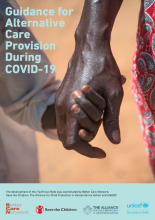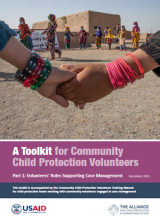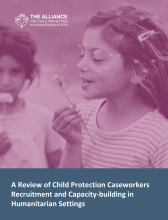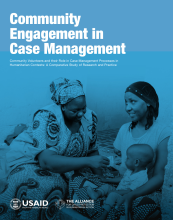
CENTRO DE RECURSOS DE ADMINISTRACIÓN DE CASOS DE PROTECCIÓN INFANTIL
La página principal con materiales sobre la gestión de casos de protección de la niñez es una plataforma virtual que sirve de base donde se recopilan materiales importantes, notas orientativas y herramientas útiles en la gestión de casos de protección de la niñez en situaciones humanitarias. Encontrará todo lo que necesite, es decir, notas orientativas, herramientas prácticas, materiales para capacitación, información útil y métodos comprobados científicamente; reunidos en un solo lugar. Navegue usando los botones y descubra todo lo que se ofrece en esta plataforma. ¡Encontrará lo que está buscando!
Lo más reciente en herramientas y materiales sobre la gestión de casos
Toolkit | Monitoring Child Wellbeing and Satisfaction in Child Protection Case Management

‘Case management’ is a core approach of child protection programming, supporting children at-risk of, and who have experienced, family separation, abuse, neglect, violence, or exploitation. While significant advances have been made in humanitarian child protection case management—including the updated inter-agency guidelines , training package and forms , there is limited evidence about which...
Notas orientativas de importancia sobre la gestión de casos de protección de la niñez en la acción humanitaria
Child Protection Case Management Actions for Sudden Programme Closures or Scale-down

The Child Protection Case Management Task Force (CMTF) of the Alliance for Child Protection in Humanitarian Action has developed guidance on exit strategies for child protection case management services, in response to the challenges posed by reduced funding for humanitarian child protection programming. This guidance outlines scenarios where services may need to be scaled back, transferred to...
Quality Assessment Framework

The Quality Assessment Framework (QAF) (field testing version) is a tool developed to enable Child Protection actors to meet the quality and monitoring requirements of operating a case management system in humanitarian contexts. Quality assessments help ensure case management activities are carried out following agreed upon processes and result in quality outputs and outcomes. The framework...
2021 UNHCR Best Interests Procedure (BIP) Guidelines: Assessing and Determining the Best Interests of the Child

The primary objective of the BIP Guidelines is to support UNHCR and partner staff in improving the protection outcomes for refugee children by: situating the best interests of refugee children within a comprehensive child protection system and; strengthening child protection case management for all refugee children. The Guidelines replace both the 2008 UNHCR Guidelines on Determining the Best...
A Five-Step Guide to Developing Inter-Agency Standard Operating Procedures for Child Protection Case Management in Humanitarian Settings

A Five-Step Guide to Developing Inter-Agency Standard Operating Procedures for Child Protection Case Management in Humanitarian Settings aims to encourage a structured approach to developing SOPs for CPCM in humanitarian settings so that those procedures are sufficiently: comprehensive; contextualised; up-to-date; user-friendly; and well-coordinated. This guidance is to be used together with the...
Herramientas prácticas de importancia para la gestión de casos de protección de la niñez en la acción humanitaria
Inter-agency Child Protection Case Management Data Protection and Information Sharing Protocol

The purpose of this Data Protection and Information Sharing Protocol (DPISP or Protocol) is to provide specific guidance to enable an agreement to be reached on data protection and information sharing in the context of inter-agency child protection case management. This Protocol establishes agreed-upon guiding principles and specific provisions on data protection. It also details appropriate...
Standard Operating Procedures (SOPs) Template

The Standard Operating Procedures template (SOPs) is a practical resource used to guide Child Protection actors in defining roles, responsibilities and relationships between different people involved in the case-management system. The SOPs will articulate and contextualize the local (and legal) processes involved in each step of managing a case, including service mapping and referral system, the...
Quality Assessment Framework

The Quality Assessment Framework (QAF) (field testing version) is a tool developed to enable Child Protection actors to meet the quality and monitoring requirements of operating a case management system in humanitarian contexts. Quality assessments help ensure case management activities are carried out following agreed upon processes and result in quality outputs and outcomes. The framework...
The Minimum Standards for Child Protection in Humanitarian Action, Standard 18

The Minimum Standards for Child Protection in Humanitarian Action have been developed to support child protection work in humanitarian settings by: Establishing common principles between those working in child protection; strengthening coordination between humanitarian actors; improving the quality of child protection programming and its impact on children; improving the accountability of child...
Guidance for Alternative Care Provision During COVID-19

This document provides practical guidance to actors in humanitarian and development contexts on the adaptations and considerations needed to support children who are either currently in alternative care or are going into an alternative care placement during the COVID-19 pandemic. It expands on the guidance provided in the Interagency Technical Note on Children and Alternative Care Immediate...
Coordination of Case Management

There are two key resources related to Case Management Coordination in humanitarian settings, these are the Case Management Standard Operating Procedures Guidance and Template. Other Coordination resources include the Terms of Reference template for a country CMTF, referral pathways template, eligibility flow chart and sample case prioritization guide for case management, these can be found in the...
Sistema para la gestión de información de casos de protección (IM4CM siglas en inglés)
Una gestión de información eficaz facilita que se trate de manera segura, ética y correcta los datos en casos de protección de la niñez durante su gestión. Consiste en herramientas, sistemas y procesos que se usan para recolectar, guardar, analizar e intercambiar información a la vez que se dá prioridad a la seguridad de la niñez y la confidencialidad. Descubra las herramientas, notas orientativas y otros materiales que le ayudarán a optimizar la gestión de información durante la gestión de casos. Encontrará todo lo que necesite para garantizar prácticas éticas, seguras y eficientes - desde la protección de datos a sistemas efectivos.
Inter-agency Guidance Note | Data Protection and Information Sharing for Child Protection Case Management in Humanitarian Settings including Specific Considerations for Settings with Refugees

This Guidance Note provides actors delivering child protection case management with guidance on the key standards and principles, processes and tools available to apply good practices for data protection and information-sharing when implementing child protection case management in humanitarian settings. It includes specific considerations in relation to the UNHCR Best Interests Procedure (BIP) in...
Information Management System (CPIMS+)

The CPIMS+ is an Information Management System that facilitates effective case management for individual vulnerable children. The database is designed to promote best practice and accountability, and to assist child protection programs in delivering quality care. The CPIMS+/Primero provides intuitive digital forms and clear workflows to assist with documenting case management processes, from...
Monitoring & Evaluating for Quality Case Management

There are two key resources related to monitoring and evaluating child protection case management in humanitarian settings. They include the Quality Assessment Framework and the Case Management Indicators. Updated key performance indicators for case management are also currently under development.
Materiales y capacitación en la gestión de casos
Refuerce la capacidad de su equipo con cursos completos y materiales e información útil sobre cómo mejorar sus habilidades durante la gestión de casos. Hay una variedad que comprende desde talleres y manuales hasta cursos virtuales y notas prácticas. Encontrará todo lo que necesite para capacitar a los gestores de casos, supervisores y sobre cómo emplear voluntarios de la comunidad para asegurar que las intervenciones sean de gran calidad durante la gestión de casos de protección de la niñez.
Child Protection Case Management Training Package for Caseworkers in Humanitarian Settings

Watch the Virtual Launch of the CM Training Package here: https://youtu.be/JWXSJ53Zz30 The Case Management Task Force (CMTF) of the Alliance for Child Protection in Humanitarian Action recognized an opportunity to improve outcomes for children by updating the child protection case management training package for caseworkers in humanitarian settings. This training package is the result of two years...
Transitioning to Remote Case Management during COVID-19 Learning Module

The Transitioning to Remote Case Management during COVID-19 learning module aims to prepare case workers to safely transition to remote case management service delivery in the context of COVID-19 and other infectious disease outbreaks. The learning module, which includes a facilitator guide and PowerPoint, is designed for coordinators, managers and technical advisors for case management programs.
Case Management Via Phone Learning Module

The Case Management Via Phone Learning Module aims to prepare case workers to safely deliver case management services via phone, when necessary, in the context of COVID-19 and other infectious disease outbreaks (IDOs). The learning module, which includes a facilitator guide and PowerPoint, is designed for frontline caseworkers, social workers and supervisors.
Community Child Protection Volunteer Toolkit and Training Manual

Today, more than ever, volunteers are on the frontlines of protecting children in their communities. Volunteers work tirelessly in complex humanitarian contexts and often face emotional and physical risks, with little recognition for their efforts. The Toolkit for Community Child Protection Volunteers and supplementary training manual aim to promote evidence-informed best practices when engaging...
A Review of Child Protection Caseworkers Recruitment and Capacity-building in Humanitarian Settings

Child protection case management in humanitarian settings requires caseworkers with the knowledge and skills to support vulnerable children and families during distressing events and in environments with limited services. In acknowledgement of those challenges, this review was conducted to provide an overview of key considerations and opportunities for strengthening caseworker recruitment and...
Case Management Competencies

The Case Management Comptencies and Skills Framework can be used as a guide to recruit and build the capacity of caseworkers and supervisors. The framework ensures all staff have appropriate skills and competencies to carry out case management interventions in a safe and professional manner. Assessment of skills and comptencies for staff conducting case management services should take place as...
Estudios investigativos y formación
Fomentando la gestión de casos a través observaciones comprobadas en la realidad. Descubra estudios científicos, lecciones aprendidas y prácticas óptimas que ayudan a mejorar de manera continua los servicios de protección de la niñez en contextos humanitarios.
Toolkit | Monitoring Child Wellbeing and Satisfaction in Child Protection Case Management

‘Case management’ is a core approach of child protection programming, supporting children at-risk of, and who have experienced, family separation, abuse, neglect, violence, or exploitation. While significant advances have been made in humanitarian child protection case management—including the updated inter-agency guidelines , training package and forms , there is limited evidence about which...
Project | Child Wellbeing Matters: Improving Case Management Practice Through Research

The aim of the Child Well-being Matters project was to fill a key gap in evidence by conducting an evaluation of the case management intervention in different countries. More than one in six of the world's children lived in areas affected by armed conflicts in 2024. During a crisis, children are at increased risk of violence, abuse, exploitation, and neglect because family, community, and...
Report | Community Engagement in Case Management

Community volunteers are an integral part of preventing and responding to cases of violence, abuse, neglect and exploitation of children in humanitarian settings. They have a deep understanding of their communities, and help to identify children who are at-risk, have experienced harm, or have been separated from their family. Following global and field research conducted in 2020, the Alliance has...
Survey Results – Updating and Expanding the Case Management Training Package

In February, an online survey was conducted for everyone involved in child protection case management in humanitarian settings to ‘ have their say’ in efforts to update the inter-agency case management training package. The Alliance and its Case Management Task Force would like to thank the 469 colleagues from 41 contexts who completed the survey. Those valuable ideas and suggestions will be used...
Case Management Supervision and Coaching Lessons Learned Report

The Case Management Supervision and Coaching Lessons Learned Report in English and French documents the effects of the initiative on collaboration and coordination, contextualization and localization. It explores the effects on the capacities of trainers, supervisors and caseworkers. Finally, it concludes with recommendations for social service workforce strengthening, sustainability and similar...
